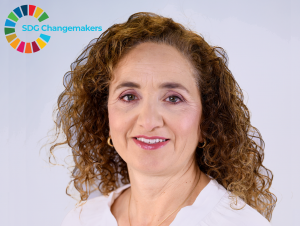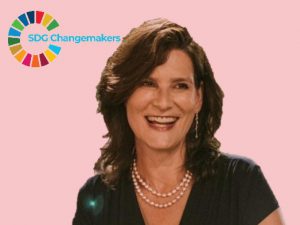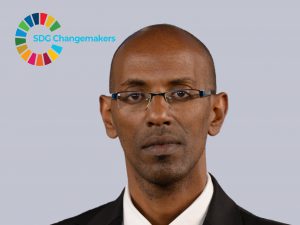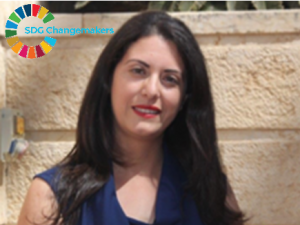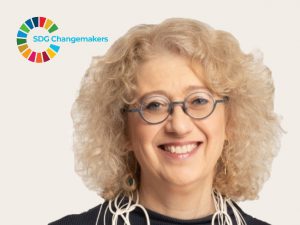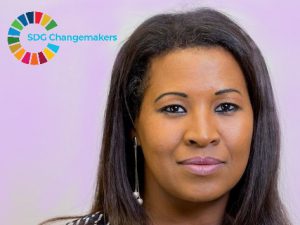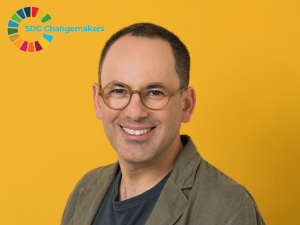Director General , Ministry of Environmental Protection 2021-2023
SII: Please briefly describe your work:
GC: As Senior Deputy Director General, I am responsible for environmental land-use planning, short and long-term policymaking, strategic planning, and international relations. My division works to protect and rehabilitate Israel’s natural resources and surroundings. This includes a long-term government policy for the Dead Sea area, which is undergoing extensive environmental degradation because of severe water scarcity and industrial operations, and implementing an action plan to deal with cliff erosion along Israel’s coastline. Also on my plate is leading advancements in the green building sector in Israel, from improving standardization, providing professional training and raising public awareness, to developing innovative financial tools to encourage widespread implementation of green building techniques.
As the Deputy Director General responsible for international relations, I lead professional delegations promoting Israel’s bilateral relations, as well as at multilateral environmental meetings including those of the Commission of Sustainable Development, Rio+20 and the Climate Change Convention. I currently serve as special adviser to the China Council for International Cooperation on Environment and Development (CCICED), Vice Chair of the OECD’s Environmental Policy Committee (EPOC) and Co-Chair of the Inter-Ministerial Steering Committee for the Implementation of Agenda 2030 for Sustainable Development and the Sustainable Development Goals.
SII: What particularly motivates you to make a difference?
GC: A belief in science-based policy making, and that a healthy environment is intimately linked to social and economic well-being.
SII: Name two principle values that you associate with your work?
GC: Consensus building – I am by nature a consensus builder. The environment touches on almost all areas of government and civil society work but rarely can we execute policy alone. I enjoy working to craft a Vision and then working to identify all relevant stakeholders, learning how to “speak their language” and persuade them of the value and importance of that vision in a way that they themselves discover the value and turn into champions of the project.
The broader long-term picture – I always try to remind myself for whom I am working – current and future generations who will need to live in an even more densely populated Israel under stress of limited resources and green spaces. While there are many powerful voices representing the interests of construction and development, we are here to push for the longer term environmental considerations to ensure the wellbeing of Israelis.
SII: Which of your activities have created the most positive impact?
GC: The projects I am most proud to have been involved in directly and indirectly are
- Welbeing Indicators – beyond GDP
- Mainstreaming of OECD benchmarking – our role in the Bureau. The fact that we now look to the OECD as the goal to which we should strive for environmental performance
- Work now being carried out on Low Carbon Economy 2050
- Strides in Green Building
- Good Neighborhood – utilizing solar energy to improve lives in the periphery
- SDGs – one of my first projects at the ministry was to work on a government decision on sustainable development which set up a committee of Directors General of all Ministries to implement those goals within their ministries. At one level one could ask, how come we are still working on that issue over twenty years later but our work on the Voluntary National Review Israel submitted for the first time this year showed me that there is a maturity that did not exist in the past. The SDGS themselves are far more sophisticated with a rich body of work on targets and indicators backed by thorough methodology. There is far more recognition of the need for a holistic, integrated approach to development in all its forms. Health cannot be discussed without reference to environmental pressures or food quality and security, social gaps cannot properly be addressed without reference to technological and digital skills training, etc.
SII: What do you consider a successful project?
GC: I enjoy projects that manage to mainstream environmental goals with other important societal goods and goals. I look for ways to “translate” the environmental aims into terms that other decision makers can understand and want to promote. For example, “Green Growth” of our current SDG policy of “Harnessing Innovation to Leave no one Behind”, in which technological and social innovation for which Israel is known is being used for environmental, social and economic change. There is growing recognition that what’s good for the environment also make sense in economic terms. In the past, the perception was that the economic bottom line was undermined by social-environmental policies, but particularly Climate Change is increasingly highlighting that short term economic gain can be disastrous in the long term. I am very proud to be part of what I believe is a necessary change in perspective, even within government.
More about Galit Cohen
Galit was born and raised in Sderot, a mid-sized city in Israel’s southern periphery, is married with two daughters. She has an undergraduate degree in Earth Sciences and a Masters in Geography, with a specialization in Environmental Policy and Management, both from the Hebrew University.
Galit began working at the Environmental Protection Ministry two decades ago. Initially she worked in physical planning and then later moved over to strategic planning, with a focus on implementing sustainability principles in the government and in Israel’s various sectors, and also in Israel’s international work in environmental policy and sustainable development. When this profile was done she was the Senior Deputy Director General for Policy, Planning and Strategy at the Ministry of Environmental Protection (2010-June 2021).
Cohen has done much to promote sustainability and long‐term, system‐wide environmental policy; from working for sustainable development at the national level, to developing the concepts of “green government” and “green economy”, to focused changes for the coastal cliffs and at the Dead Sea.
UPDATE: On January 10th 2023 , the Director General of the Ministry of Environmental Protection, Galit Cohen, informed the newly elected Minister of Environmental Protection, Eidit Silman, of her desire to end her position as Director General of the Ministry of Environmental Protection.
“I had the privilege of serving the public and the environment in the office for 22 years in a variety of positions, and reaching the most senior professional position in the last year and a half – the office’s CEO. I am grateful for the opportunity given to me along the significant path I have taken. I am happy for the privilege of being in a country where a girl from the city of Sderot, like me, can imagine and dream that one day she will reach such a senior and influential position in the country. And also to fulfill the dream,” said Cohen.
Cohen also stated in her letter: “As the director general of the ministry, we raised the issue of the climate crisis to the top priority list of the government and the state; the issue of preserving nature, biological diversity and the restoration of water streams received the status it deserved; significant budgets were directed to these issues and especially to the local municipalities, so that they could respond to the residents; we prepared Licensing reform that will enable a leap forward in environmental standards in the world of environmental risks and pollution as well as the regulation of industrial activity; we continued with a coherent policy for handling waste and forging cooperation with the local municipalities with the aim of establishing advanced facilities; we left no one behind – and also gave tools and budgets to the Arab sector as part of the precedent plan. “


